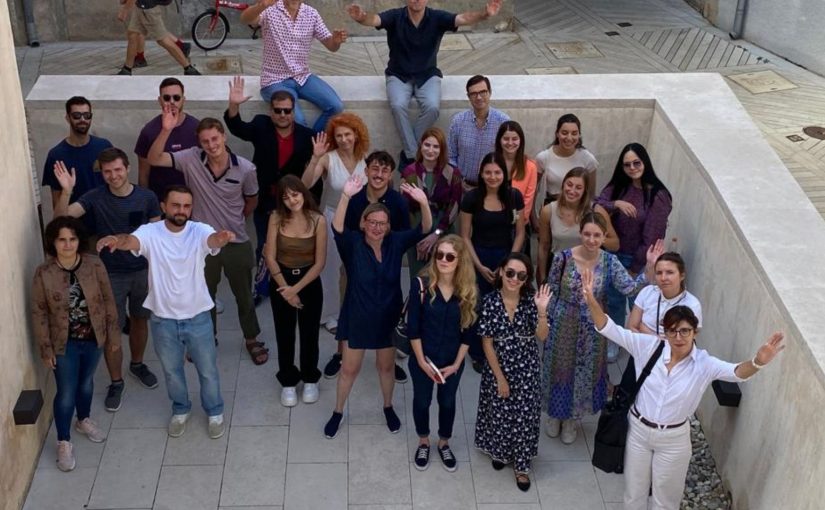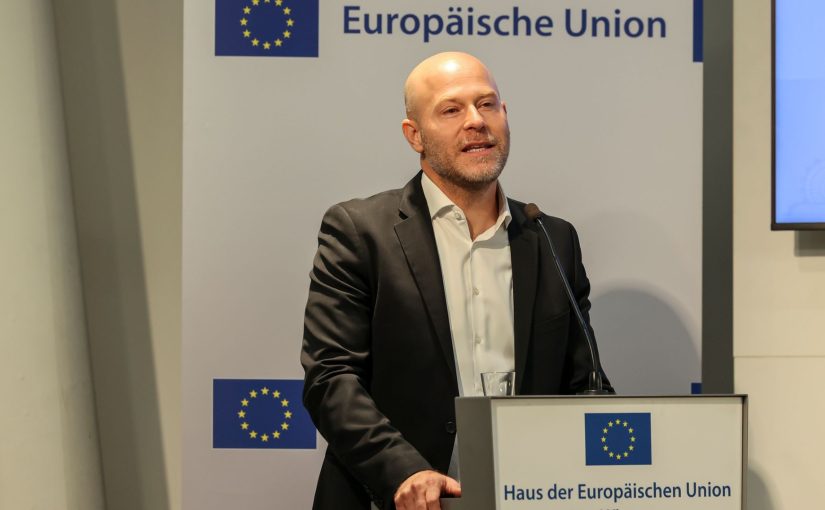Policy Briefs
|
11 Jul, 2424
The European Union in Search of Its Own Mythology
By: Olena Pokotilo
The attractiveness of the European Union is based on its economic and social model as well as on its manifold national cultural heritage. Throughout the post-Cold War period, the EU has not actively promoted pan-European myths and struggles today with creating a cohesive and credible common narrative. In this context, the author of this Policy Brief argues that to maintain its unity amidst global instability and evolving political landscapes, the EU must develop new, meaningful myths. She discusses the characteristics of the myth-design of the Union and offers policy recommendations.
The attractiveness of the European Union is based on its economic and social model as well as on its manifold national cultural heritage. Throughout the post-Cold War period, the EU has not actively promoted pan-European myths and struggles today with creating a cohesive and credible common narrative. In this context, the author of this Policy Brief argues that to maintain its unity amidst global instability and evolving political landscapes, the EU must develop new, meaningful myths. She discusses the characteristics of the myth-design of the Union and offers policy recommendations.
Survey
|
13 Jun, 2424
ÖGfE Post-election survey shows a clear commitment to EU membership in Austria
76 % of Austrians are in favor of EU-membership | 17 % want to leave the EU
Policy Briefs
|
07 Jun, 2424
Attitudes Towards the EU and the EP Election in 2024 in Austria
By: Sylvia Kritzinger, Katharina Pfaff
With the election to the European Parliament citizens’ attitudes towards both the EP elections and the European integration are back in the focus of political and societal stakeholders. Questions like their interest in the election to the European Parliament, their likelihood to vote, their stance on European unification, and policy measures they consider important for the future of the EU are in the centre of interest. In this context, the authors of this Policy Brief analysed the Austrian citizens’ attitudes towards the EP elections and their views on the future of the EU in light of the upcoming EP election. They provide valuable insights for political and societal stakeholders ahead of the election and offer policy recommendations.
With the election to the European Parliament citizens’ attitudes towards both the EP elections and the European integration are back in the focus of political and societal stakeholders. Questions like their interest in the election to the European Parliament, their likelihood to vote, their stance on European unification, and policy measures they consider important for the future of the EU are in the centre of interest. In this context, the authors of this Policy Brief analysed the Austrian citizens’ attitudes towards the EP elections and their views on the future of the EU in light of the upcoming EP election. They provide valuable insights for political and societal stakeholders ahead of the election and offer policy recommendations.
Policy Briefs
|
06 Jun, 2424
Disinformation and Foreign Interference: A Challenge for the EU and Its Member States
By: Dietmar Pichler
Election times are always accompanied by an increased amount of disinformation from both domestic and foreign actors. In particular, international actors see them as a prime opportunity to sway public opinion and potentially affect election outcomes. This applies to both the elections to the European Parliament as well as the parliamentary elections of individual member states. In this context, the author of this Policy Brief analyses the present threats posed by disinformation and foreign interference within the EU, outlines strategies to address these challenges, and offers policy recommendations for the EU and EU member states.
Election times are always accompanied by an increased amount of disinformation from both domestic and foreign actors. In particular, international actors see them as a prime opportunity to sway public opinion and potentially affect election outcomes. This applies to both the elections to the European Parliament as well as the parliamentary elections of individual member states. In this context, the author of this Policy Brief analyses the present threats posed by disinformation and foreign interference within the EU, outlines strategies to address these challenges, and offers policy recommendations for the EU and EU member states.
Opinion
|
11 Mar, 2424
Rural Intelligence: The Next Challenge for European Domestic Diplomacy (German Marshall Fund, March 2024)
Protesting farmers and haggling politicians in European institutions bring to light the central role that subnational territories—mostly rural regions—play in the bloc’s climate transition agenda. Policymakers, including diplomats, should develop place-based awareness and rural intelligence, in order to anticipate, manage, and mitigate place-specific climate risks and socioeconomic conflicts.
Cres Summer School
|
01 Dec, 2323
Towards a more equal and democratic Europe (Op-Ed European Western Balkans)
What we want is a Europe where everyone is equal. A community that puts EU enlargement, youth participation, and gender equality at the center of the discussion about the future of our common European home.
Policy Briefs
|
28 Oct, 2323
Media and minorities in Bosnia and Herzegovina: a path towards an inclusive and democratic society
By: Sarina Bakić
The author of this Policy Brief presents a broader overview of some of the most significant aspects regarding the role of media in building democracy in terms of the reinforcement and affirmation of minorities in Bosnia and Herzegovina, whether as a result of ethnic background, religious belief, sexual orientation, geographic location, income level, etc. Once the mentioned media’s support and affirmation of minorities is accomplished, such groups can effusively participate in and contribute to this country's institutions and society in general. This is an attempt to revive and reconsider the issue related to minority cultural identities and communication via media in the context of the democratisation process in general. It is very much needed to open new discussions related to media and democracy due to the current global political crisis that is reflecting in Bosnia and Herzegovina’s media sphere as well.
The author of this Policy Brief presents a broader overview of some of the most significant aspects regarding the role of media in building democracy in terms of the reinforcement and affirmation of minorities in Bosnia and Herzegovina, whether as a result of ethnic background, religious belief, sexual orientation, geographic location, income level, etc. Once the mentioned media’s support and affirmation of minorities is accomplished, such groups can effusively participate in and contribute to this country's institutions and society in general. This is an attempt to revive and reconsider the issue related to minority cultural identities and communication via media in the context of the democratisation process in general. It is very much needed to open new discussions related to media and democracy due to the current global political crisis that is reflecting in Bosnia and Herzegovina’s media sphere as well.
Policy Briefs
|
28 Oct, 2323
Rebuilding democracy from below: A case for local communities in Montenegro
By: Nikola Mumin, Marija Popović Kalezić
Montenegro has been experiencing a crisis in democracy for several years now. The authors of this Policy Brief explore the role that local communities (LCs) have and/or can have within the context of democratic elections, democratic governing, and institutional reforms in Montenegro. Against this background, they recommend that the democratic potential that lies in local communities, as legally defined governing bodies, needs to be utilised in order to address the ongoing crisis of democratic governing in Montenegro and help the country accelerate key reforms in the EU accession process.
Montenegro has been experiencing a crisis in democracy for several years now. The authors of this Policy Brief explore the role that local communities (LCs) have and/or can have within the context of democratic elections, democratic governing, and institutional reforms in Montenegro. Against this background, they recommend that the democratic potential that lies in local communities, as legally defined governing bodies, needs to be utilised in order to address the ongoing crisis of democratic governing in Montenegro and help the country accelerate key reforms in the EU accession process.
Opinion
|
27 Oct, 2323
Paul Schmidt: EU integration process is always the art of compromise (EWB Interview)
After two years of blockade, EU member states during July reached a consensus on opening negotiations with North Macedonia and Albania. Ukraine and Moldova became candidate countries for membership in the European Union. Many believe that the war in Ukraine has returned the focus of the member states to the enlargement process.
WB2EU Public Debate & Europaclub Spezial: Is EU enlargement back on track? Moving towards a democratic and united Europe, 9 October 2023
At the conclusion of our three-year Erasmus+ Jean Monnet Network project on Europeanisation, democratisation and strengthening of civil society in the Western Balkans (WB2EU), coordinated with the oiip and in cooperation with 15 partners from all over Europe, we want to discuss current developments, obstacles, and perspectives of the EU enlargement and reform process.
ÖGFE PORTFOLIO

Veranstaltungen
Veranstaltungsreihen “Europa Club Wien”/”Europa Club Live” und weitere
The European Union in Search of Its Own Mythology
By: Olena Pokotilo
The attractiveness of the European Union is based on its economic and social model as well as on its manifold national cultural heritage. Throughout the post-Cold War period, the EU has not actively promoted pan-European myths and struggles today with creating a cohesive and credible common narrative. In this context, the author of this Policy Brief argues that to maintain its unity amidst global instability and evolving political landscapes, the EU must develop new, meaningful myths. She discusses the characteristics of the myth-design of the Union and offers policy recommendations.
The attractiveness of the European Union is based on its economic and social model as well as on its manifold national cultural heritage. Throughout the post-Cold War period, the EU has not actively promoted pan-European myths and struggles today with creating a cohesive and credible common narrative. In this context, the author of this Policy Brief argues that to maintain its unity amidst global instability and evolving political landscapes, the EU must develop new, meaningful myths. She discusses the characteristics of the myth-design of the Union and offers policy recommendations.












